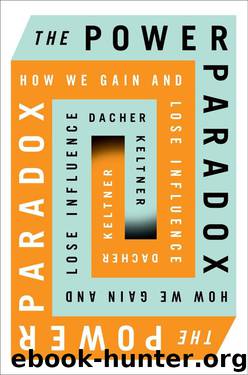The Power Paradox: How We Gain and Lose Influence by Dacher Keltner

Author:Dacher Keltner [Keltner, Dacher]
Language: eng
Format: epub
Publisher: Penguin Publishing Group
Published: 2016-05-17T06:00:00+00:00
In the relevant study, I brought pairs of strangers to the lab: one person in each pair felt more powerful vis-à-vis the other, while the other felt less powerful. The pairs told each other stories about an event that had inspired them in the past five years, like a relative who devoted a life to volunteering, or a friend who risked harm to break up a fight, or a person who started a volunteer organization to help victims of sexual violence. After telling their stories, participants then indicated how inspired and amazed they were by their own story, and how inspired and amazed they felt in hearing the story of the other participant. The person feeling powerful proved to be inspired more by telling his or her own story than by hearing the other participant’s story.
You might think this could be due to a difference in the inspiring qualities of the stories—perhaps more powerful people lead more inspiring lives and as a result tell more elevating stories. Not so. A team in my lab coded all stories for how inspiring they were and found no differences in those told by more powerful and less powerful participants. The sounder conclusion to draw is that when we are feeling powerful, we are moved more by our own experiences than by those of other people. The shift in attention brought about by power—from others to ourselves—costs us in terms of being moved by others’ inspiring acts.
The costs of diminished empathy and the moral sentiments are considerable. We lose the passions that give rise to the altruism and cooperation that are vital to enduring power. The less powerful are likely to find more powerful people to be disconnected from their concerns (a source of stress that accompanies states of powerlessness that we will focus on in the next chapter). And this corrupting influence of power diminishes perhaps the strongest, most reliable sources of meaning and happiness in life: empathy, compassion, gratitude, and elevation and the acts of altruism they inspire. Feelings of power, by directing our attention to our own desires and interests, actually undermine our self-interest. And most germane to Lord Acton’s power-corrupts thesis, this diminishing of the moral sentiments sets in motion a cascade of outward abuses of power.
Download
This site does not store any files on its server. We only index and link to content provided by other sites. Please contact the content providers to delete copyright contents if any and email us, we'll remove relevant links or contents immediately.
Cecilia; Or, Memoirs of an Heiress — Volume 1 by Fanny Burney(32558)
The Great Music City by Andrea Baker(32018)
Cecilia; Or, Memoirs of an Heiress — Volume 2 by Fanny Burney(31956)
Cecilia; Or, Memoirs of an Heiress — Volume 3 by Fanny Burney(31941)
We're Going to Need More Wine by Gabrielle Union(19046)
All the Missing Girls by Megan Miranda(16023)
Pimp by Iceberg Slim(14506)
For the Love of Europe by Rick Steves(14121)
Bombshells: Glamour Girls of a Lifetime by Sullivan Steve(14073)
Talking to Strangers by Malcolm Gladwell(13370)
Norse Mythology by Gaiman Neil(13363)
Fifty Shades Freed by E L James(13239)
Mindhunter: Inside the FBI's Elite Serial Crime Unit by John E. Douglas & Mark Olshaker(9339)
Crazy Rich Asians by Kevin Kwan(9291)
The Lost Art of Listening by Michael P. Nichols(7506)
Enlightenment Now: The Case for Reason, Science, Humanism, and Progress by Steven Pinker(7311)
The Four Agreements by Don Miguel Ruiz(6765)
Bad Blood by John Carreyrou(6621)
Weapons of Math Destruction by Cathy O'Neil(6279)
